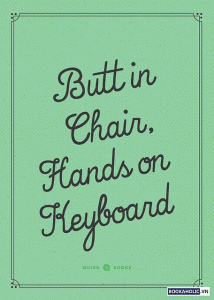Secrets Readers Don’t Know about Authors
A lot goes on behind the scenes in getting a book published. Stuff that readers don’t know and probably don’t need to know. Because, let’s face it, all a reader cares about is a story that takes them out of the real world and into another that, when well done, leaves them wanting more even after they’ve reached The End.
But, because I like to have fun, I figured I’d share some secrets readers may not know about authors. It’s a way of poking fun at an author’s reality (at least mine!). So let’s peel back Oz’s curtain, shall we?

copyright Dajana Fabjanovich | flickr
We pretend the writing is going well when it isn’t. Ask a writer how their story is going and you’ll hear, “Oh, it’s all finally coming together,” or “I’ve hit a rough spot in the middle, but I know I’ll work it out,” or “I’ve got an idea for another book, but I have to finish this one first.” However, that’s all code for, “I’m halfway through this book and I have no idea where it’s going,” or “I’ve written myself into a corner, and I’m freaking out because I have a deadline in three weeks!” or “I’ve got an idea for another book because I’ve started hating the one I’m writing right now.”
Writing books is a lonely business. We sit with our laptop or tablet, alone, and try to bang out story day after day. But we can’t have interruptions because that’ll mess with our creative juju. Which makes us feel alone. So we try to explain where our heads are at with loved ones, who try to understand us but really don’t, because we need an outlet to vent. Which is why we commiserate with other authors because only other authors understand the lonely nature of writing. Which is why…
We all have a stash of something to help us through writing stresses, and we usually indulge at our keyboard. Chocolate. Potato chips. Beer. Martinis. Gummy bears. Ice cream. Red wine. White wine. Diet soda. Burgers and fries. Scotch. Oreos. Mac and cheese. Pizza. Slurpees…

copyright Bookaholic | flickr
We procrastinate. A lot. A little. But we all do it. And when we do, we get frustrated. And when that happens, we move on to chocolate, or potato chips, or beer, or martinis…
Staring at a blank screen (writer’s block) scares the crap out of us. We pretend it doesn’t exist. We pretend it doesn’t bother us. We try to write anything, even if it has nothing to do with the current story we’re working on, to get the creative spark going again. And if the writer’s block lasts longer than we’re comfortable with, we move on to chocolate, or potato chips, or beer, or martinis…
By the time we get to The End of the first draft, we feel like we’ve birthed quintuplets. Naturally. But then we have to go back and edit the draft, and that feels like we’re birthing five more. Which leads to chocolate, or potato chips, or beer, or martinis…
Writing an 80,000 word novel is a lot easier than writing a one-page synopsis. When we’re faced with the dreaded synopsis (which is a dirty word in our business), we’ll reach out to fellow writer friends to bitch and moan that we have to do it. Which leads to other authors commiserating with us over our mutual pain. Which leads to those other authors suggesting we indulge in chocolate, or potato chips, or beer, or martinis…
Our characters are real people in our heads. We talk to them. Ask them questions. Imagine them eating and sleeping and having sex. Fighting and shopping and, yes, even farting or burping. We watch movies and imagine how our own characters would react in certain scenes. We spend entire days with them in our heads, but to us it feels like they’re right there beside us. For real. Often, we know our characters better than the people closest to us in real life. Often, we prefer it that way.
We speak in code. We look forward to getting The Call but are more than happy to SP if we can, and we always feel like it’s Christmas morning when ARCs arrive. Many of us question if we’re YA or SFF or TT, but will also try out UF or WF or XG, if nothing really fits. Some of us also really get into NaNoWriMo (but not me).
Writers sometimes think the words they’ve written are the best they’ve written in a long time. We often consider it a good sign when we can’t tell the difference.
Our search histories could raise red flags. To make our books realistic, our research takes us to some very questionable websites. ‘Nuf said.
Some of us still write story longhand. I finally gave that up three years ago, after doing it for nearly 17 years. It was a big adjustment. Oreos helped me through.
Some of us see the scene in our head and type with our eyes closed. But not me. If I did, I’d put my fingers on the wrong keys…and think it was the best thing I’d written in a long time.
We love our fans and readers. Which may not be a secret after all.



